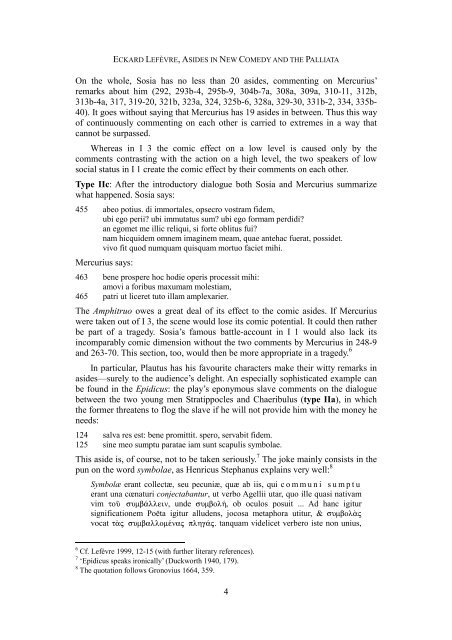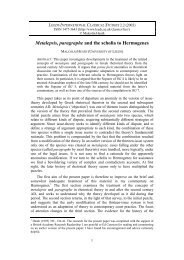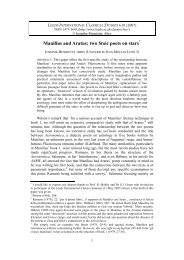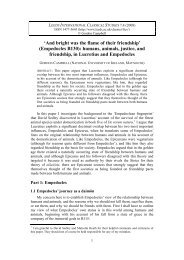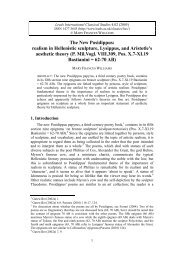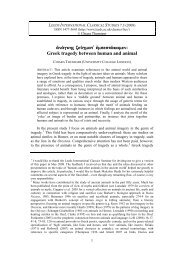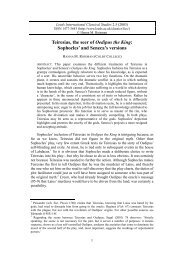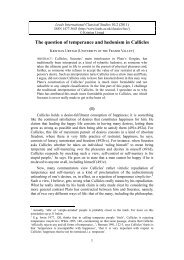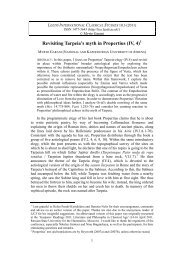Asides in New Comedy and the Palliata - Leeds International ...
Asides in New Comedy and the Palliata - Leeds International ...
Asides in New Comedy and the Palliata - Leeds International ...
Create successful ePaper yourself
Turn your PDF publications into a flip-book with our unique Google optimized e-Paper software.
ECKARD LEFÈVRE, ASIDES IN NEW COMEDY AND THE PALLIATA<br />
On <strong>the</strong> whole, Sosia has no less than 20 asides, comment<strong>in</strong>g on Mercurius’<br />
remarks about him (292, 293b-4, 295b-9, 304b-7a, 308a, 309a, 310-11, 312b,<br />
313b-4a, 317, 319-20, 321b, 323a, 324, 325b-6, 328a, 329-30, 331b-2, 334, 335b-<br />
40). It goes without say<strong>in</strong>g that Mercurius has 19 asides <strong>in</strong> between. Thus this way<br />
of cont<strong>in</strong>uously comment<strong>in</strong>g on each o<strong>the</strong>r is carried to extremes <strong>in</strong> a way that<br />
cannot be surpassed.<br />
Whereas <strong>in</strong> I 3 <strong>the</strong> comic effect on a low level is caused only by <strong>the</strong><br />
comments contrast<strong>in</strong>g with <strong>the</strong> action on a high level, <strong>the</strong> two speakers of low<br />
social status <strong>in</strong> I 1 create <strong>the</strong> comic effect by <strong>the</strong>ir comments on each o<strong>the</strong>r.<br />
Type IIc: After <strong>the</strong> <strong>in</strong>troductory dialogue both Sosia <strong>and</strong> Mercurius summarize<br />
what happened. Sosia says:<br />
455 abeo potius. di immortales, opsecro vostram fidem,<br />
ubi ego perii? ubi immutatus sum? ubi ego formam perdidi?<br />
an egomet me illic reliqui, si forte oblitus fui?<br />
nam hicquidem omnem imag<strong>in</strong>em meam, quae antehac fuerat, possidet.<br />
vivo fit quod numquam quisquam mortuo faciet mihi.<br />
Mercurius says:<br />
463 bene prospere hoc hodie operis processit mihi:<br />
amovi a foribus maxumam molestiam,<br />
465 patri ut liceret tuto illam amplexarier.<br />
The Amphitruo owes a great deal of its effect to <strong>the</strong> comic asides. If Mercurius<br />
were taken out of I 3, <strong>the</strong> scene would lose its comic potential. It could <strong>the</strong>n ra<strong>the</strong>r<br />
be part of a tragedy. Sosia’s famous battle-account <strong>in</strong> I 1 would also lack its<br />
<strong>in</strong>comparably comic dimension without <strong>the</strong> two comments by Mercurius <strong>in</strong> 248-9<br />
<strong>and</strong> 263-70. This section, too, would <strong>the</strong>n be more appropriate <strong>in</strong> a tragedy. 6<br />
In particular, Plautus has his favourite characters make <strong>the</strong>ir witty remarks <strong>in</strong><br />
asides—surely to <strong>the</strong> audience’s delight. An especially sophisticated example can<br />
be found <strong>in</strong> <strong>the</strong> Epidicus: <strong>the</strong> play’s eponymous slave comments on <strong>the</strong> dialogue<br />
between <strong>the</strong> two young men Stratippocles <strong>and</strong> Chaeribulus (type IIa), <strong>in</strong> which<br />
<strong>the</strong> former threatens to flog <strong>the</strong> slave if he will not provide him with <strong>the</strong> money he<br />
needs:<br />
124 salva res est: bene promittit. spero, servabit fidem.<br />
125 s<strong>in</strong>e meo sumptu paratae iam sunt scapulis symbolae.<br />
This aside is, of course, not to be taken seriously. 7 The joke ma<strong>in</strong>ly consists <strong>in</strong> <strong>the</strong><br />
pun on <strong>the</strong> word symbolae, as Henricus Stephanus expla<strong>in</strong>s very well: 8<br />
Symbolæ erant collectæ, seu pecuniæ, quæ ab iis, qui c o m m u n i s u m p t u<br />
erant una cœnaturi conjectabantur, ut verbo Agellii utar, quo ille quasi nativam<br />
vim toà sumb£lle<strong>in</strong>, unde sumbol», ob oculos posuit ... Ad hanc igitur<br />
significationem Poëta igitur alludens, jocosa metaphora utitur, & sumbol¦j<br />
vocat t¦j sumballomšnaj plhg£j. tanquam videlicet verbero iste non unius,<br />
6 Cf. Lefèvre 1999, 12-15 (with fur<strong>the</strong>r literary references).<br />
7 ‘Epidicus speaks ironically’ (Duckworth 1940, 179).<br />
8 The quotation follows Gronovius 1664, 359.<br />
4


